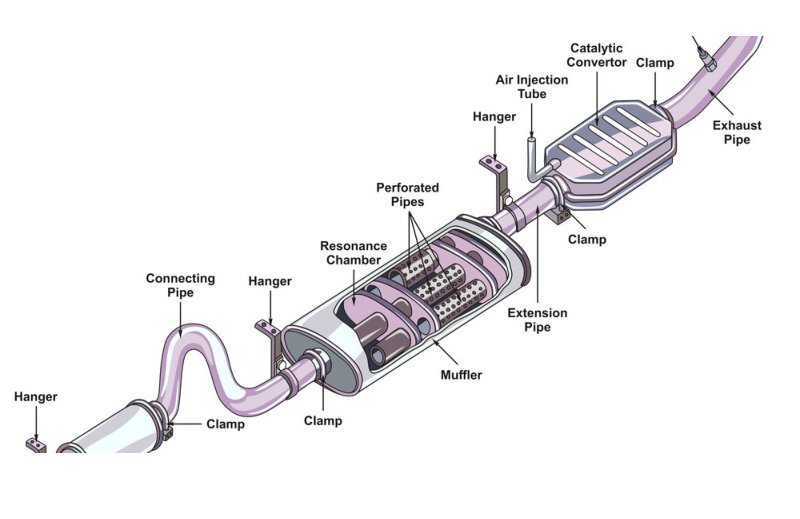A truck’s exhaust system is a vital yet often overlooked part of its overall performance, safety, and compliance. It does more than just guide smoke out the tailpipe—it manages harmful gases, reduces noise, improves fuel efficiency, and ensures the truck meets legal emission standards. Whether you drive a light commercial truck or a heavy-duty rig, understanding how your exhaust system works helps you maintain your vehicle and avoid costly repairs.
Main Functions of a Truck Exhaust System
Directs Harmful Gases Away from the Engine and Cabin
Combustion engines produce gases like carbon monoxide, nitrogen oxides, and hydrocarbons. These are toxic if inhaled and must be quickly removed from the engine bay and cabin area. The exhaust system routes these gases safely out the rear of the vehicle, protecting the driver and anyone nearby.
Reduces Engine Noise
One of the most noticeable functions of the exhaust system is noise reduction. Without it, your truck would be incredibly loud—especially under load. Components like the muffler and resonator are designed to dampen the sound created by combustion and gas flow. A properly working system creates a smoother, quieter ride and helps you meet road noise regulations.
Controls Emissions
Modern trucks are subject to strict environmental regulations. The exhaust system plays a central role in controlling emissions through devices like:
- Catalytic converters, which convert harmful gases into less toxic substances.
- Diesel Particulate Filters (DPFs), which capture and burn off soot from diesel engines.
These parts are essential for compliance with Australian Design Rules (ADR) relating to emissions. Driving without a functioning emissions system can result in fines, failed inspections, and environmental harm.
Improves Engine Efficiency
A well-functioning exhaust system improves overall engine efficiency. By clearing exhaust gases effectively, it reduces back pressure in the engine. Less back pressure means the engine can breathe better—leading to improved fuel economy, better throttle response, and even more power. The right exhaust setup supports smoother combustion and performance, especially under heavy loads or long-distance hauling.
For those looking to upgrade or maintain their setup, a wide range of truck exhaust and accessories is available to suit various truck models and configurations.
Key Components That Make It All Work
Each part of the exhaust system works together to ensure safe and efficient operation:
- Exhaust manifold – collects gases from the engine cylinders
- Catalytic converter – reduces harmful emissions
- Turbocharger (in some trucks) – improves air intake efficiency
- Muffler – minimises engine noise
- Resonator – fine-tunes and reduces sound further
- Diesel Particulate Filter (DPF) – removes soot from diesel emissions
- Tailpipe – final exit point for gases
Each of these parts has a specific function but relies on the rest of the system to work effectively.
Common Signs of Exhaust Issues
Knowing when your exhaust system needs attention can save you from expensive repairs. Look out for:
- Loud or unusual noises (rattling, hissing, or roaring)
- Reduced fuel efficiency
- Visible rust, holes, or black smoke
- Strong exhaust smell in the cabin
- Dashboard warning lights, especially on diesel vehicles
If you notice any of these, it’s worth getting the system checked by a qualified technician.
Why Proper Maintenance Matters
Exhaust components are exposed to heat, moisture, and road debris—all of which can cause damage over time. Regular inspections help you:
- Catch small problems before they become major
- Ensure you’re meeting emissions and noise standards
- Avoid health risks due to gas leaks
- Improve performance and fuel economy
Keeping your exhaust in good condition isn’t just about your truck—it’s also about driver safety, legal compliance, and environmental responsibility.
Final Thoughts
A truck exhaust system plays a much bigger role than simply venting gases. It’s critical for safety, performance, emissions control, and comfort. Whether you’re upgrading your system or ensuring it stays roadworthy, regular attention to your exhaust setup can pay off in both the short and long term.

